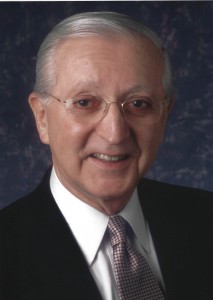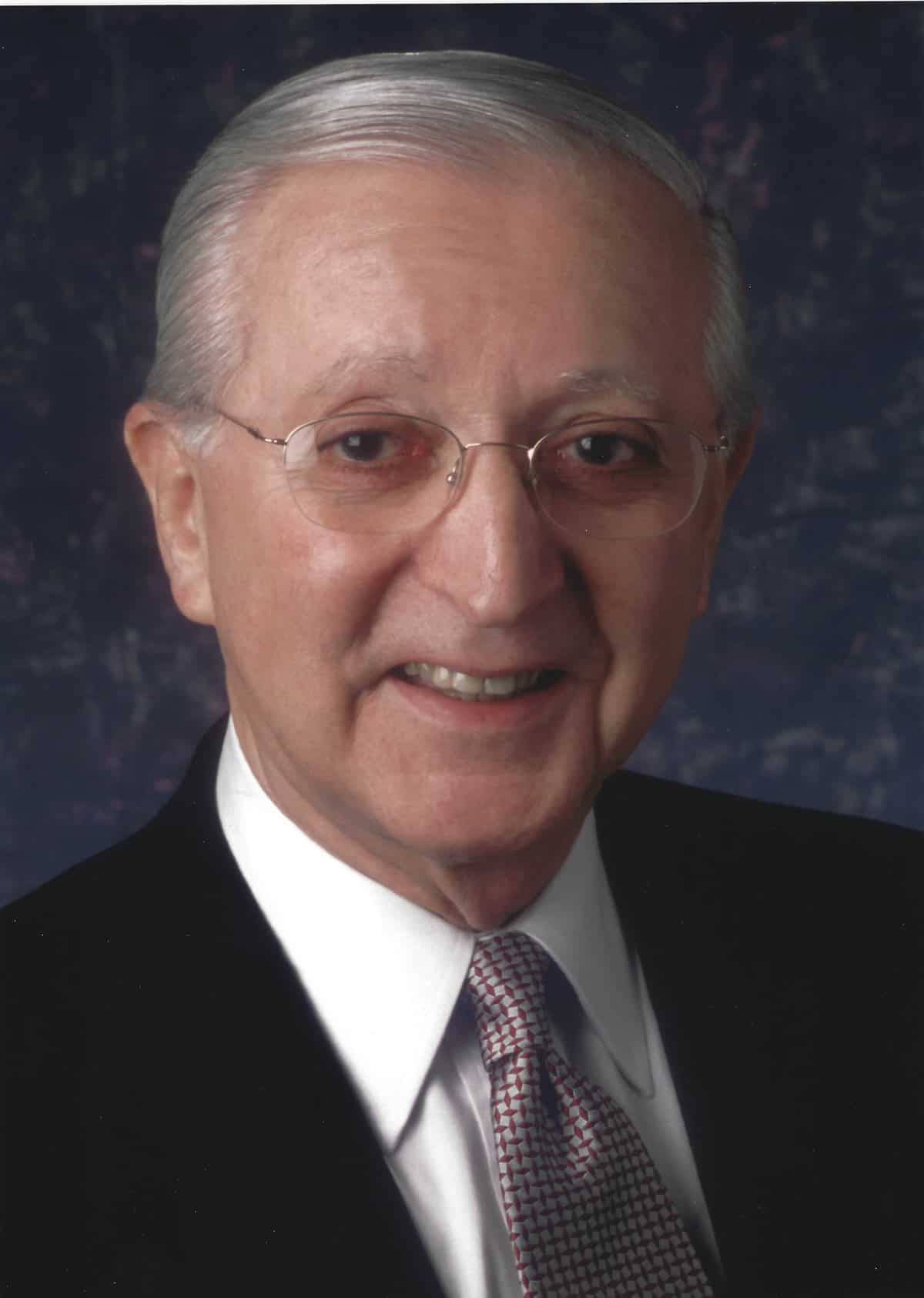 Tidewater’s Jewish community lost a giant on Saturday, June 6 with the passing of Kurt Rosenbach.
Tidewater’s Jewish community lost a giant on Saturday, June 6 with the passing of Kurt Rosenbach.
Kurt was equally a man of vision and action. More than all of his volunteer service—often as founder or chair, he continued to press the community to realize financial security and be innovative in programs and projects. In many ways, he altered the direction of the Jewish and greater Tidewater communities—and always for the better.
Kurt was dignified, a mensch, kind, wise, smart, warm, articulate, passionate, beloved, a friend…and always impeccably attired.
The following is excerpted from Rabbi Rosalin Mandelberg’s eulogy of Kurt Rosenbach on June 8, 2020.
On May 19, 2006 at Ohef Sholom, on the occasion of the celebration of the 70th Anniversary of his Bar Mitzvah, Kurt shared the following legend from our tradition: There is a story that Honi Ha-Me’aggel once saw on his travels an old man planting a carob tree. Honi stopped and asked him when he thought the tree would bear fruit?
“After seventy years” was the reply. “Do you expect to live seventy years and eat the fruit of your labor,” Honi asked?
The old man answered: “I did not find the world desolate when I entered it and as my fathers planted for me before I was born, so do I plant for those who will come after me.”
And then Kurt concluded his speech: “so, it is with that thought that all of us will hopefully plant a carob tree or two, that I thank you for being at my second bar mitzvah and extend an invitation to all of you to attend my third bar mitzvah at a future date to be announced. Amen and shabbat shalom.”
I can think of no better story to illustrate the remarkable life and impeccable character of our beloved Kurt. For above all, Kurt was a planter, a man whose sole purpose in life was to improve upon the world as he found it and to build up his Jewish and Civic Hampton Roads communities for all who would follow. Above all Kurt planted for his children, grandchildren and great grandchildren and for every other of the many thousands of people he befriended, mentored and helped in his near century of living.
In his wise, gentlemanly, and purposeful way, Kurt guided us to do good and right by one another and to construct the institutions, structures and services that would sustain us for generations to come. He was a man of great strength, vision, and dedication, yet also of gentleness, humility, humor, and a bit of mischievousness as well (as you could tell by his invitation to his third Bar Mitzvah at a future date). Kurt was indefatigable in his quest to secure all of our future and we are grateful to God for the immeasurable gift of the 97 extraordinary years we were able to share with this incomparable mensch.
There is no doubt that Kurt’s person and values were shaped by his childhood experiences. Although he did not like to talk about it, fortunately, Rose insisted he document his childhood, which he did in 2002 in exquisite detail. Kurt was born on June 5, 1923 in Kassel, Germany, a sizable city of 275,000 people. Prior to 1933, Kurt recalled “a pleasant, comfortable life with my parents, Felix and Frieda and my brother Hans…. My father had his own small retail business and we lived a typical middle-class lifestyle. Most of my friends were not Jewish and came from the nice neighborhood in which we lived, or from school….
“After Hitler came to power by being named Reichschancellor on January 30. 1933, which was also my mother’s birthday, changes came quickly. There was an ever increasing program of Jewish persecution, economic constraints placed on Jews, instances of physical violence and an onslaught of horrible propaganda against us.”
Kurt recalls that gradually Christian people were afraid to associate with, or do business with Jews, which took its toll on his father’s business. This eventually necessitated its closure, forcing the family to move from their home and finally, to flee to the United States in February of 1938, only after an elderly aunt secured their sponsorship. Less than a year later, the beautiful synagogue to which Kurt belonged and where he became a Bar Mitzvah on June 13, 1936, was destroyed along with many other synagogues, Jewish businesses, and Jewish lives on Kristallnacht, the Night of Broken Glass, November 9, 1938.
Kurt reflected, “Sometimes, I have thought about the wrenching decision my parents had to make to uproot themselves, go to a strange country where they did not speak the language, with little money and no idea what they would do or face. But there was no alternative….”
In spite of the hardship, Kurt considered he and his family to be among the more fortunate in that they survived. Throughout his life, he revered his parents for their sacrifices and resilience.
After their arrival in the United States, the family settled in Baltimore and, while his parents struggled, Kurt’s new found Jewish American friends helped him learn English quickly and his sharp mind and determination enabled him to succeed in school, to graduate in accounting from night school at the University of Baltimore, and to pass the CPA exam on the first try! All the while, Kurt worked first with a paper route on Sunday mornings, and then at Bond Clothes in downtown Baltimore on Saturdays and after school, where he sold men’s furnishings. Following his graduation, he began his professional career at Schleisner’s Company fine women’s specialty store as an accountant. Advancing quickly, he became comptroller and director.
It was during this time that Kurt’s life changed forever and for the good. He was set up on a blind date with the beautiful, smart, and vivacious Rose Rottenberg and, as you said, Rose, “you just clicked.” They shared many of the same interests and in short order were married at Baltimore Hebrew Congregation. Kurt proved to be all Rose thought he would be—a wonderful husband and a doting and devoted father. They enjoyed 67 wonderful years of marriage filled with many dear friends; extensive travel, local arts and culture especially Kurt’s favorite—the opera; and above all making a beautiful family.
Kurt always believed in a good education and hard work as the keys to success and, throughout his adult life, he was tenacious. In 1955, Kurt accepted a promising business opportunity and he and Rose, along with 9-month-old Carolyn, relocated to Norfolk where he joined Rices Nachman in the finance department.
Eventually he became the department store’s Chairman of the Board, and when he retired in 1985 after thirty years, he took a short-term job with Haynes that lasted 23 years. Kurt said the move to Hampton Roads was among the best decisions of their lives.
He described his career as an active and fulfilling one, but he also believed wholeheartedly in the importance of being part of building Greater Hampton Roads. As a proud member of the Jewish community, he had a lot to offer the city of Norfolk and the arts, proudly never hiding the fact that he was Jewish. Over the years, Kurt was a leader in every arena of life. Just to highlight a few of the institutions he founded and/or helped to build: he served as chairman of the United Way of South Hampton Roads; founding president of the Downtown Norfolk Development Corporation; director of the Norfolk Foundation, which is now the Hampton Roads Community Foundation, and vice president of Greater Norfolk Corporation. He was truly instrumental in building up the downtown Norfolk and waterside districts we know today.
In the Jewish community he served as president of Ohef Sholom Temple; founder and president of the Ohef Sholom Foundation; treasurer and Life Trustee of the Tidewater Jewish Foundation; executive committee and board member of the United Jewish Federation, and chairman of the Beth Sholom Endowment Fund. Among others, he was the recipient of the Humanitarian Award of the Virginia Center for Inclusive Communities and the Lifetime Achievement Award of Volunteer Hampton Roads. It is no wonder, as Rose said, Kurt was everyone’s go-to guy in every realm of life unto the very last.
Kurt didn’t do any of it for the titles or the recognition. Everything he did was to secure the Jewish and civic institutions he believed in to his core. I could spend a day talking about his great love for Ohef Sholom alone: how gratifying his life-long service to the Temple was to him; how he secured our present and future through his creation of our foundation; how he guided us through more than one crisis and long after he should have had to worry about it; how he was a friend to his rabbis and cantors, fellow officers, board members and congregants; how forward thinking he was in being open to new ways of worshiping and doing things even if he himself didn’t love them personally, but because they were for the betterment of the temple and its future; and how, through his 96th year, he would listen quietly at meeting after meeting and then clear his throat and stand up to speak to attentive men and women of all ages who did not want to miss any of his wise counsel. He was beyond touched that a service award is named in his honor and so proud of each of its recipients. There are no words of gratitude great enough to thank Kurt.
Kurt loved our congregation, the Tidewater Jewish community, the City of Norfolk and greater Hampton Roads, but he did all that he did for another reason as well, and that was to be a role model to the family you and he created, cherished and adored, Rose.
Kurt met every challenge and then some and we are all so much the better because of you and we are forever grateful. We will miss you more than we can ever say, but you will live on in the good deeds you performed and in the hearts of a grateful family, synagogue, community, and world who will cherish your memory forever. Zecher Tzadik Livracha. May the memory of the righteous, of our beloved Kurt Rosenbach, be always for a blessing. Amen.

